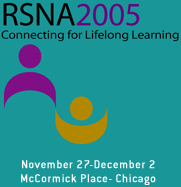
Abstract Archives of the RSNA, 2005
Claudio Dario MD, Presenter: Nothing to Disclose
Silvia Giovannetti, Abstract Co-Author: Nothing to Disclose
Giovanni Bettiol, Abstract Co-Author: Nothing to Disclose
Alessandra Ramelli MD, Abstract Co-Author: Nothing to Disclose
Claudio Saccavini PhD, Abstract Co-Author: Nothing to Disclose
Francesco Di Paola MD, Abstract Co-Author: Nothing to Disclose
Andrea Baraldo, Abstract Co-Author: Nothing to Disclose
Andrea Oliani MD, Abstract Co-Author: Nothing to Disclose
Renato Scienza MD, Abstract Co-Author: Nothing to Disclose
et al, Abstract Co-Author: Nothing to Disclose
HEALTH OPTIMUM is a Telemedicine project to validate organisational, technological and medico-legal practices and to disseminate the results. The systems interoperability and the technological management of the patient documentation are fundamental: creation, digital signature, transmission and storage follow international standards and rules.
The project was approved and co-funded by the European Community and involves Spain-Aragona (Oncology, Haemotology, Radiology, Haemodialysis and Laboratory), Denmark-County of Funen (tele-counselling) and Italy-Veneto Region as Coordinator (Neurosurgical Tele-counselling and Tele-Laboratory POCT), other than technological and organisational partners. Neurosurgical Tele-counselling wants to satisfy the need to give fast and formalized answers to consultancy requests for urgent cases of cranial and vertebro-medullary trauma, from a Peripheral Hospital to a Neurosurgical Centre. When the peripheral Physician needs a neurosurgical consultancy he types and digitally signs a request, with patient’s data and clinical and anamnestic information. Then he sends it with CT images to the General Hospital Neurosurgeon. The Neurosurgeon can involve a Neuroradiologist for a second opinion; then he types and digitally signs his opinion in the form and sends it to the requesting Physician. The form management system is based on XML-CDAv2 and HL7 standard; digital signature follows law and rules; all CT images are in DICOM format. Data are available for longitudinal EHR and it is managed following IHE XDS profile to guarantee a high level of applications interoperability.
Physicians have defined the reorganisation of workflow using telemedicine approach and they have defined the forms clinical data set. All the systems implementation for communication between Hospitals have already demonstrated that often the unnecessary transportation of patients and documents can be avoided.
The reorganization and optimisation of processes and human resources, the clinical and technological standardisation bring about positive results. Rules and law about security and privacy are respected, medico-legal responsibilities are defined.
Dario, C,
Giovannetti, S,
Bettiol, G,
Ramelli, A,
Saccavini, C,
Di Paola, F,
Baraldo, A,
Oliani, A,
Scienza, R,
et al, ,
The HEALTH OPTIMUM Project: The Standards Application to Telemedicine Workflow. Radiological Society of North America 2005 Scientific Assembly and Annual Meeting, November 27 - December 2, 2005 ,Chicago IL.
http://archive.rsna.org/2005/4406915.html

